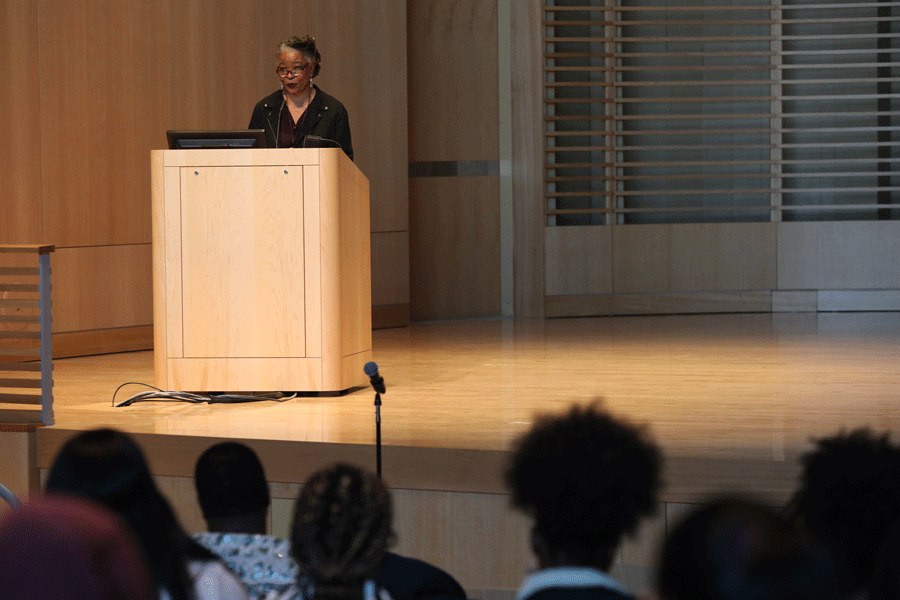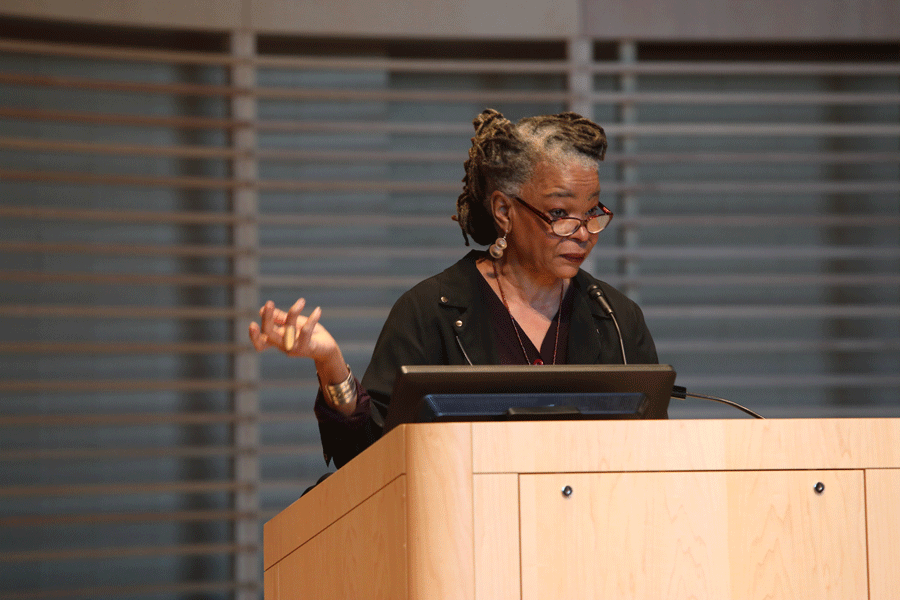- Apply
- Visit
- Request Info
- Give
Renowned Author Marie-Celie Agnant Speaks At Eastern
Written by Molly Boucher
Published on March 09, 2020
Renowned author and activist Marie-Celie Agnant visited Eastern Connecticut State University on March 4 to lecture on her experience writing about Haitian diaspora and social activism. During her lecture, Agnant read “Antoine’s Departure” and answered questions from students about her writing process, views of Haiti and her book, “The Book of Emma.”
After a warm welcome, Agnant talked about her experience in Haiti. After being born and raised in Port-au-Prince, she left the country at age 16. “If we had to leave our country, it was because of political oppression,” said Agnant. “Our poverty is not accidental.” When she arrived in Montreal, Canada, she was shocked by the view of race in the United States and Canada. At age 16 she learned of segregation and Nelson Mandella for the first time, which she described as a shock after coming from a country inhabited by black people. Agnant explained that the extreme poverty rates in Haiti are a result of the debt owed to France after the Haitian revolution, a debt of $28 billion that the country did not finish paying off until 1947. “That was the cost of freedom,” said Agnant.
After inviting up a member of the audience to read the story with her, Agnant presented “Antoine’s Departure,” a story about “Antoine” and his wife having a conversation about Haiti. Antoine expresses hope that Haiti can become a stronger country, and ends by leaving his wife in the morning, with her knowing she will never see him again.
Agnant revealed that the story was based on Antoine Izméry, a Haitian businessman and pro-democracy activist who was murdered outside St. Jean Bosco Church, a building Agnant had passed by during her childhood. Antoine was killed during a commemoration of the St. Jean Bosco massacre, which had occurred five years prior in 1988.
After working as a teacher and translator, Agnant began writing, saying literature and storytelling have always been a piece of her. “It was very deep in me to become a writer,” said Agnant, stating that when she was growing up all she ever wanted to do was hear stories. She continued with this passion into her adult years, writing her first book as a result of a series of interviews she completed with women in Canada.
She explained that she had interviewed French-Canadian, Italian and Haitian women. After meeting with a well-known Haitian author who was going to write the book they had planned, Agnant decided “he was too arrogant... I decided I would just write it.” Since then she has written numerous poems, novels and novellas. Her most well-known piece, “Livre d'emma,” which translates to “The Book of Emma,” was the main topic of many students’ questions at the event.
When the floor opened for guests to ask questions, Agnant went into depth about her connection to Haitian culture within her writing, saying, “I would not say I use Haitian culture, rather it is a part of myself.” She then described her current relationship with the country. “What I write is not welcomed everywhere in Haiti. I was raised with fear; fear is what defined my childhood.”
When asked about her methods of writing, Agnant went on to explain that her writing style might be viewed by some as unconventional. “I never had a strategy,” said Agnant. “I always just wrote.” After being asked about her motivation to write “The Book of Emma,” she said, “I knew I wanted to write about the solitude of black women.”
Agnant also took time to comment on what it means to be a black woman and how she has noticed a lack of empowerment within the community. This exploration led her to talk about relations with men, and eventually she found a connection to slavery that she had not originally planned on. Agnant expressed the importance of the reader when asked about motivations and symbols within her story, saying, “When I am writing, I leave space for the reader... the book is unfinished with me, but it’s continued with you.”




